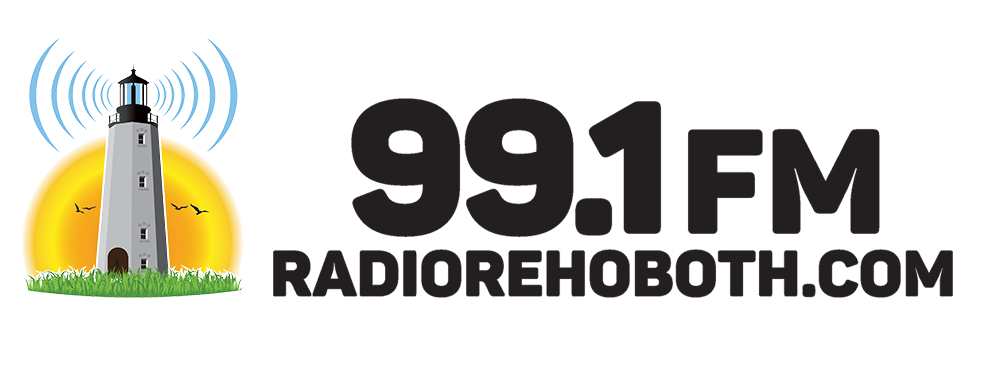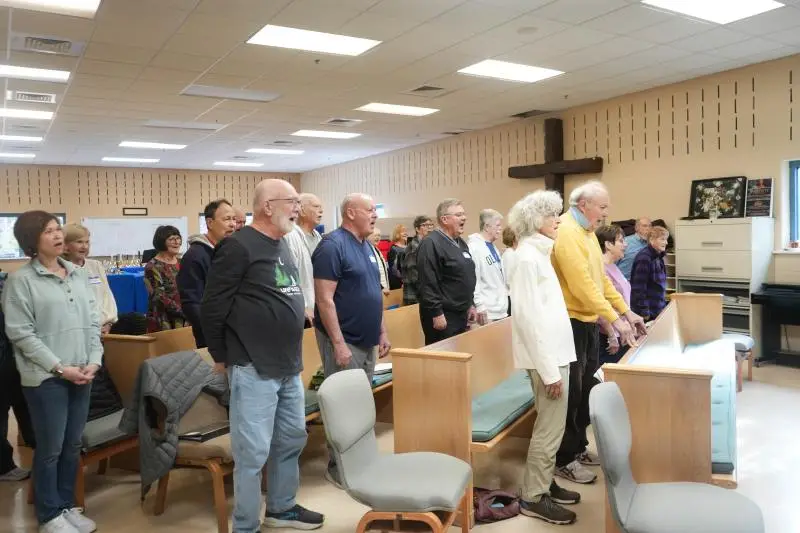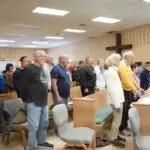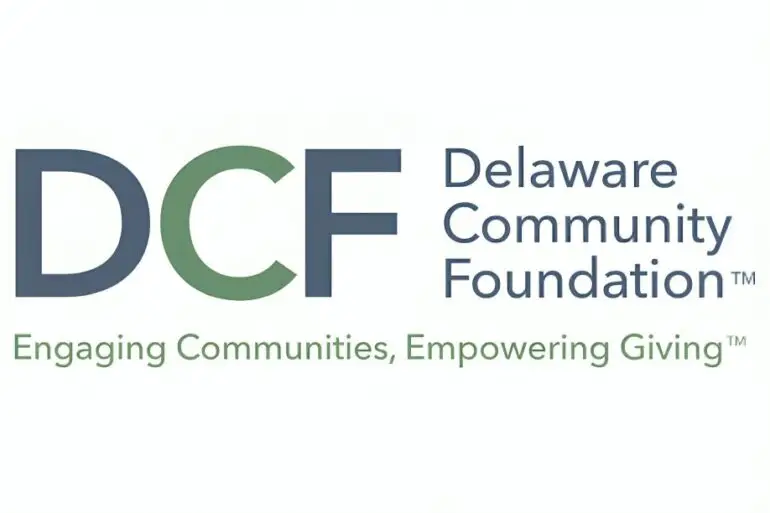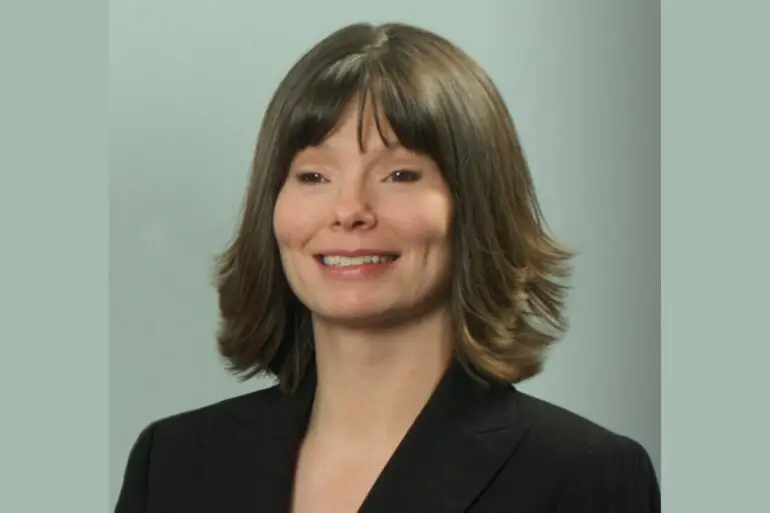-
 play_arrow
play_arrow
Radio Rehoboth
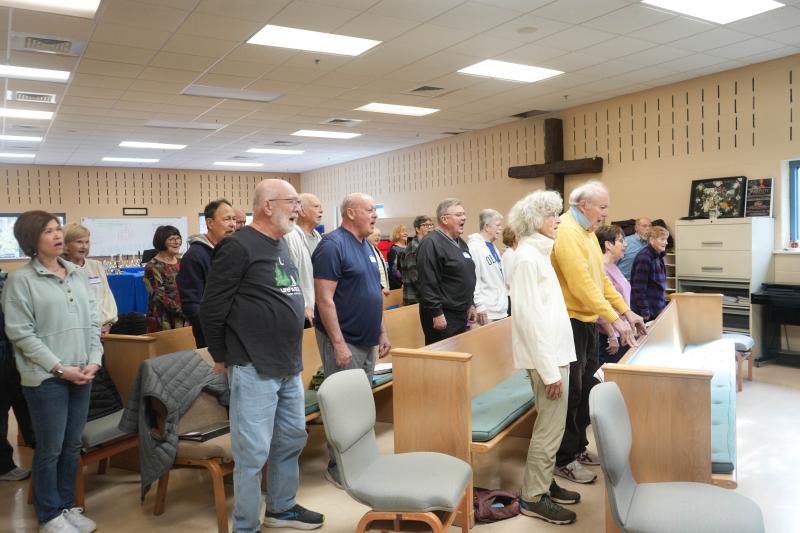
Neck rolls, shoulder shrugs and stretches came before an array of “wees,” moving up and down pitch like a siren, filled a brightly lit church room.
Then on to held “ahhs” and other vowel sounds, as members of the Parkinson’s Education and Support Group of Sussex County choir warmed up their vocal cords and bodies for their weekly rehearsal.
The choir, formed by PESGSC in October, aims to help members with Parkinson’s strengthen their vocal muscles, improve speech clarity and refine their breath control – all of which are often affected by the disease, said Amanda Peters, RISE gym co-owner who helped create the group.
“Exercise is our medicine, and we need to do it consistently,” said member Rose Verona, who was diagnosed with Parkinson’s in March 2023. “This kind of [vocal] exercise, and speaking, and being clear, is extremely important. Each time you don’t take your medicine, you get worse. If you continually work on your voice [and] your body … it slows down your symptoms.”
Director Doug Yetter begins each rehearsal with an activity to engage and stimulate the members’ brains – Parkinson’s can cause memory loss – and encourage them to practice projecting their voices, a task often made difficult by the disease’s stiffening of muscles.
Last week, members shared their hobbies with the group. Bob Kirby, 75, spoke about his longtime love for singing, his voice breaking as he opened up about how Parkinson’s has affected his ability to sing.
“Some days my voice is as strong as it ever was,” Kirby said, tearily. “Some days it’s just a whisper.”
Verona couldn’t help but tear up listening to him speak.
“I just want to cry because I get it,” she said. “You give stuff up in order to live this life with Parkinson’s. A lot of people have given up a lot of stuff.”
Despite the sacrifices, they continue to push forward, and each week, around 25 or so members show up to rehearsals.
Just last month, when the choir first started meeting, members were hesitant or unable to speak in front of the group. Now, many are willing to try.
Seeing the tremendous growth of the group has been exciting and encouraging, Verona said.
On an individual level, Verona has seen the value of both vocal and bodily exercises. She began training at RISE soon after she received her diagnosis, but she found herself unable to complete many of the exercises.
“I didn’t have the strength, didn’t have the courage,” she said. “The first three or four weeks, I just cried, because I was devastated.”
Now, along with many of her fellow choir members, she trains at the gym several times a week and is stronger than ever.
The members look to each other for support, forming a community through which they can find encouragement and joy.
“What motivates me is we all have the same affliction in different degrees,” Kirby said. “But we’re all working together to help each other. I might have a stronger voice – even though I question my voice – than others, and that may help [motivate] them to be better.”
Dave Muto, who received his Parkinson’s diagnosis 12 years ago, said he feels like he got lucky with the choir.
Muto described being in advanced stages of his prognosis, but singing and participating in the choir has helped to slow down the disease’s course.
While there’s no cure for Parkinson’s and the exact cause is still unknown, one study shows that group singing can improve some aspects of vocal production.
“The effects [of the disease] are going to eventually come stronger than they are right now,” Kirby said. “Anything I can do to help my voice get back into shape or stave off the long-term effects, I’m all for it.”
The group has been preparing for its first performance, set for 10 a.m., Thursday, Dec. 12, at Epworth United Methodist Church. They’ll be singing a variety of tunes, Yetter said, including two Beatles songs, a couple old standards and four Christmas songs.
Yetter said he’s learned a lot from the group, namely, how wonderfully resilient they are.
The members often describe their days as A days, B days or C days, defining each by the severity of their symptoms. A days entail the least severe symptoms; C days entail the most.
“Just about everybody leaves here saying it was an A day,” Yetter said of the rehearsals. “So the singing and everything will make you feel better.”
“I’m a proponent of [the choir] because of what [it] did for me,” Verona said. “I’m slowing Parkinson’s down for me. And everyone can. That’s the whole thing.”
Go to Source:https://www.capegazette.com/article/parkinson%25E2%2580%2599s-group-forms-community-through-singing/284213
Author: Ellen McIntyre
Written by: RSS
Similar posts
Chart
Top popular

News Briefs 10/17/23
Board of Commissioners Workshop & Special Meeting – November 6

Six Sussex road projects considered in latest CTP
NFL Week 17 highlights: Packers, 49ers, Saints, Steelers win, Cardinals stun Eagles
Knicks vs. Cavaliers prediction, odds, line, spread, time: 2023 NBA picks, Nov. 1 best bets from proven model
Copyright 2023 East Sussex Public Broadcasting, Inc.
